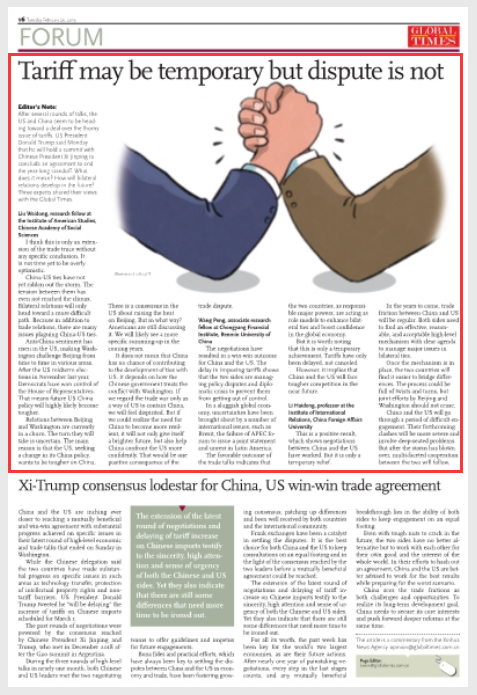Major Power Relations
Your Present Location: PROGRAMS> Major Power RelationsTariff may be temporary but dispute is not
Source: Global Times Published: 2019-2-25
Editor's Note: After several rounds of talks, the US and China seem to be heading toward a deal over the thorny issue of tariffs. US President Donald Trump said Monday that he will hold a summit with Chinese President Xi Jinping to conclude an agreement to end the year-long standoff. What does it mean? How will bilateral relations develop in the future? Three experts shared their views with the Global Times.

Liu Weidong, research fellow at the Institute of American Studies, Chinese Academy of Social Sciences
I think this is only an extension of the trade truce without any specific conclusion. It is not time yet to be overly optimistic.
China-US ties have not yet ridden out the storm. The tension between them has even not reached the climax. Bilateral relations will only head toward a more difficult path. Because in addition to trade relations, there are many issues plaguing China-US ties.
Anti-China sentiment has risen in the US, making Washington challenge Beijing from time to time in various areas. After the US midterm elections in November last year, Democrats have won control of the House of Representatives. That means future US China policy will highly likely become tougher.
Relations between Beijing and Washington are currently in a churn. The turn they will take is uncertain. The main reason is that the US, seeking a change in its China policy, wants to be tougher on China. There is a consensus in the US about raising the heat on Beijing. But in what way? Americans are still discussing it. We will likely see a more specific summing-up in the coming years.
It does not mean that China has no chance of contributing to the development of ties with US. It depends on how the Chinese government treats the conflict with Washington. If we regard the trade war only as a way of US to contain China, we will feel dispirited. But if we could realize the need for China to become more resilient, it will not only give itself a brighter future, but also help China confront the US more confidently. That would be one positive consequence of the trade dispute.
Wang Peng, associate research fellow at Chongyang Financial Institute, Renmin University of China
The negotiations have resulted in a win-win outcome for China and the US. The delay in imposing tariffs shows that the two sides are managing policy disputes and diplomatic crisis to prevent them from getting out of control.
In a sluggish global economy, uncertainties have been brought about by a number of international issues, such as Brexit, the failure of APEC forum to issue a joint statement and unrest in Latin America.
The favorable outcome of the trade talks indicates that the two countries, as responsible major powers, are acting as role models to enhance bilateral ties and boost confidence in the global economy.
But it is worth noting that this is only a temporary achievement. Tariffs have only been delayed, not canceled.
However, it implies that China and the US will face tougher competition in the near future.
Li Haidong, professor at the Institute of International Relations, China Foreign Affairs University
This is a positive result, which shows negotiations between China and the US have worked. But it is only a temporary relief.
In the years to come, trade friction between China and US will be regular. Both sides need to find an effective, reasonable, and acceptable high-level mechanism with clear agenda to manage major issues in bilateral ties.
Once the mechanism is in place, the two countries will find it easier to bridge differences. The process could be full of twists and turns, but joint efforts by Beijing and Washington should not cease.
China and the US will go through a period of difficult engagement. Their forthcoming clashes will be more severe and involve deep-seated problems. But after the storm has blown over, multi-faceted cooperation between the two will follow.























































































 京公网安备 11010802037854号
京公网安备 11010802037854号





